HOME | ABOUT US | MEDIA KIT | CONTACT US | INQUIRE
HOME | ABOUT US | MEDIA KIT | CONTACT US | INQUIRE
Of Education, Inspiration and Aspiration
“The mediocre teacher tells. The good teacher explains. The superior teacher demonstrates. The great teacher inspires.”
—William A. Ward
The late Mr. Ward, a longtime administrator at a small private college in Texas, was onto something. Inspiration, however, is rarely invoked in the heated and litigious battles over K-12 funding formulas, or during legislative discussions about per-student spending on state university campuses.
And yet that particular skill—the ability to inspire in students not just a desire to learn but to live what they learn—may be the most important contribution that an educator makes over the course of a career. It’s a quality we look for every year at Ingram’s when we take on a nearly impossible task: winnowing to a comparative handful the rich roster of candidates for consideration
as one of Missouri’s and Kansas’ Icons of Education.
Since launching this program in 2009, we’ve recognized the career contributions of dozens of administrators, professors, academic researchers and teachers whose true contributions to education can’t really be measured—least of all, not by graduation rates.
After all: How does one measure inspiration?
With apologies to Justice Potter Stewart, we might not be able to precisely define it, but we know it when we see it. And we see evidence of that inspiration all around us. For that, we’re indebted to educators like Ingram’s
Icons of Education.
Long may they inspire.
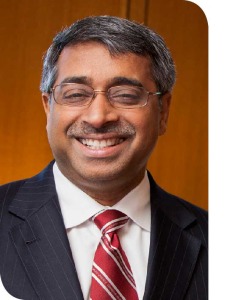 Mahendra Gupta
Mahendra Gupta
Washington University
His father was a businessman who made a businessman’s proposition: You can go to America, you can get that MBA, but you need to come back to the family business so I can get a return on my investment.
Mahendra Gupta did return to India after finishing at Carnegie Mellon, but something, he says, was nagging at him—a deeper yearning to keep learning, to more fully understand the numbers and the processes that determine whether a business succeeds or fails.
“He had not extracted a full return yet, and he knew that once I came for my Ph.D., it was very unlikely I would go back in the family business” of food products, agriculture and real estate, says Gupta, now the dean of the Olin School of Business at Washington University.
But timing was everything: Gupta had married, had become a father, and had the opportunity to work on that doctorate at Stanford. He also had an older brother who could step in. “I owe a lot to him because he gave me the relief to do what I wanted to do.” And yet, even Gupta himself didn’t know then that he wanted to become a teacher, or an administrator, or a 25-year resident of St. Louis. As it turns out, he has relished the roles of all three.
As a teacher, “I discovered another passion, the teaching and making a difference in the thought processes of the students,” he says. “I fell in love with that. I confess, that was not something I had experienced before and could not articulate when doing my Ph.D.”
But being in an academic setting, as opposed to the corporate world of cost accounting, allowed him to further his own knowledge, as well. “It was not just about my own intellectual curiosity,” he says.”The job allowed me to do the same for a generation of students I have come in contact with.”
Gupta had no designs on becoming a dean, but in 2005, he did just that. “It was more a sense of how do I extend what I know for the greater benefit of the organization,” he said. “The more I got into administration, the more I felt that I can do it, and I can do it well, but I can also impact an even greater number of individuals than those who work with me on research or in my classroom.”
The rewards of connecting with students come back to him every time he happens upon an Olin school graduate. “They tell me, ‘I remember this is what you taught us,’ and many times, it’s something even I have for-
gotten,” says Gupta. “That makes you appreciate the impact you may have as a professor, as a dean or just as somebody who can lend a caring ear.”
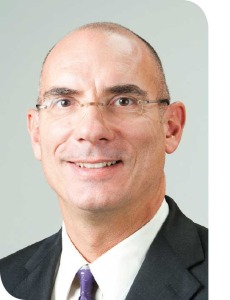 Tim de Noble
Tim de Noble
Kansas State University
Be honest: Have you ever met a second-grader who responded to that career-preference inquiry by asserting “I wanna be an architect!”?
If so, you haven’t met Tim de Noble, dean of the College of Architecture, Planning and Design at Kansas State University. To be fair, though, his father was the city planner and director of economic development for Little Rock, Ark., so it wasn’t exactly a foreign concept. “He knew all sorts of folks in the design and construction industry, so I kind of grew up thinking that was the norm,” de Noble says.
The second-grader’s dream was dashed by what de Noble calls “a rather immature decision to go to TCU, which didn’t have an architectural program.” The closest he could come to it was urban studies, which provided some of the analytical challenge, but failed to satisfy the creative urge. That would come after transferring to Texas-Arlington, where he earned his degree. “The magnetism of architecture drew me in rapidly,” he says. “I fell in love with it and never looked back.”
He earned a master’s at Syracuse University and spent the better part of a decade in Italy and Mexico City, absorbing varied design influences—and all the while, keeping his hand in the profession with firms he started with professors and fellow students.
“I love seeing how architecture and design—all design; I have a great appreciation for building design, landscape architecture, interior design—I love to see how each of them can enrich and contribute to life,” says de Noble, whose Little Rock firm, deMX architecture, is still operating after 18 years.
He joined the architecture faculty at Arkansas in 1997 and ventured into administration in 2005, leading that department for four years before coming to K-State. Though he considers Fayetteville part of the Midwest, the move made him realize immediately that he was sitting near the anchor for design, architecture, engineering and construction—Kansas City.
“That became very, very obvious,” he says. Design professions tend to be coastal-centric, “but the fact is, Kansas City is epicentric and has a huge influence on design and construction across the nation. It’s fantastic.”
That proximity also helps drive his vision for architectural instruction: “We have four tenets I hold up as good design,” de Noble says. “Promoting stewardship of the environment, social equity, economic viability and aesthetic delight. Promoting those values, that’s what I do. That’s what excites me, as much as designing a wonderful building for a client.”
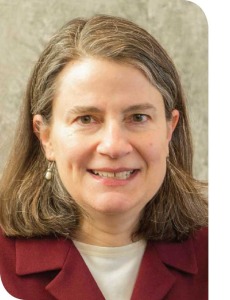 Wendy Slutske
Wendy Slutske
University of Missouri
Ever bet someone that you could chug a pitcher of beer?
If so, you’re Wendy Slutske’s idea of interesting. She’s a professor of psychology at Mizzou, where she explores factors that contribute to alcohol and gambling addictions, and where she’s part researcher, part teacher and part mentor.
“It was pretty late in my career that education became a focus,” she says. “My main focus has been on being a scientist and a researcher. I applied to graduate school because I wanted to stay in school, and I wanted to become a professor because I wanted to stay in school!” But mentoring graduate students is part of the job for professors at research-intensive institutions, so she took on that duty, and “it has now become one of the things that I enjoy the most. It has been extremely gratifying to work with talented young people and to see their own interests and careers take shape.” All three of her current trainees, in fact, have secured federal research grants, “so it is a great time in my research lab.”
A native of Milwaukee, she was raised by a widowed mother, whose strength and independence made an impact. “Because of my research into how traits such as interests and talents run in families, I’ve often thought that my career interests were a blending of my father’s and mother’s—he was a psychiatrist and she was a computer programmer/systems analyst.”
Her undergraduate adviser at the University of Wisconsin, Tim Baker, “got me hooked on a career studying addictions,” Slutske says, pausing to recognize the “pretty weird choice of words” behind that recollection. She’s earned accolades—including a Chancellor’s Award for Faculty Research last year—for the work she’s done in studying addictions. “I started out as an alcohol researcher and moved over to also studying gambling because there were some commonalities,” she says. “And I was able to use the knowledge that I had acquired as an alcohol researcher in the more fledgling field of gambling research. “
She’s particularly proud of collecting data for a project involving Australian twins and factors that may have contributed to gambling addictions. “Many forms of gambling have been legal in Australia for much longer than they’ve been in the United States,” she says, creating something that fighter pilots might call a target-rich environment. She teamed up to help collect a unique data set on the gambling habits, mental-health problems and personality traits among twins—work that’s led to roughly 15 publications since 2009, with potentially more to come.
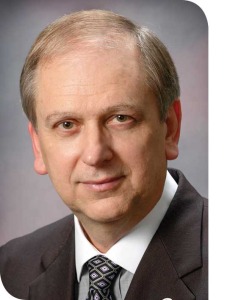 Larry Gould
Larry Gould
Fort Hays State University
A good thesaurus yields nearly 40 synonyms for “anachronism,” but almost no opposites that would apply to Larry Gould, a man who seems to have spent his entire life at the right place, at the right time—and embracing megatrends that defined America for half a century.
From witnessing a new dawn in Scientific America after Sputnik, to the democratization of higher education, from living through the civil-rights era and Vietnam to engaging something called the Internet long before competing colleges realized its potential, Gould is the product of an unbridled intellectual curiosity about the way mankind processes current events and a deep-seated belief that, in his words, “education is the fuel that runs the ship of the state we call American democracy.”
His list of signature accomplishments defies description. The native of Massacusetts’ Berkshires region came to Fort Hays State in 1984 as founding director of its Docking Institute of Public Affairs, taught political science, for eight years, served as dean of the college of arts and sciences for seven and as provost for 16. He chaired the search committee that made recently-retired Ed Hammond FHSU’s president in 1987. He’s served on Regents’ committees and the faculty senate, and even chaired Hays’ planning commission for 28 years. And he was among the chief architects of distance-learning initiatives that have given Fort Hays a huge footprint in China, among other places, in the early 1990s.
“FHSU was able to refine the quality of its product before competitors ever entered the market,” Gould says, and its on-line reach today “addresses the issues of accessibility, accountability and affordability in ways that have had a positive influence on state policy and online learners. Not only thousands of Kansans have acquired higher education they might otherwise would not have been able to access otherwise, thousands of U.S. citizens all over the country have been the beneficiaries of this constantly improving system of delivery and learning.”
Gould sees the challenges facing all universities as the precipice of another megatrend. “As we move into an ‘age of brands’ from a more conventional ‘age of competition,’ reputation and the value proposition are go-
ing to come under greater scrutiny,” he says. “You better deliver what you say you’re going to deliver, while constantly looking over your shoulder.” With retention, graduation, attainment and other factors measured more than ever before, he says, “no matter what the target, accountability means responsibility for outcomes, not just outputs.”
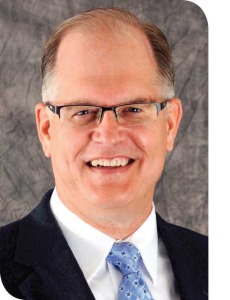 Ralph Flori
Ralph Flori
Missouri University of Science & Technology
Someone once drew a caricature—a pretty good one, actually—of Ralph Flori in conductor’s garb, leaning out of a locomotive. It played on the image of a trainmaster who kept his students on track to graduate with engineering degrees.
“Unfortunately, some students do not realize early enough in junior and high school that they can actually take and be successful in STEM fields, and they ‘get off the train,’ ” says the head of the geosciences and geological engineering program at Missouri University of Science & Technology.
Flori has been a fixture in Rolla almost since the day he set foot on the campus as a freshman in 1975. Along the way, he has risen steadily through the ranks from lecturer to program director, gathering an impressive array of university-issued and national teaching awards, including 18 campus awards as outstanding teacher. It’s not a surprising story for the boy who grew up in Cape Girardeau, tinkering with gears, belts and other parts related to Ralph Sr.’s air-conditioning business. “When I was in junior high school, I first heard that one could go to college and study engineering,” he remembers. “ I remember at the time thinking that this was a slam dunk for me.”
But he didn’t head to college with engineering curiosity alone: Values instilled from his father’s hard work, his mother’s deep thinking, his Eagle Scout achievements and competitive sports honed him for academic success, and he graduated first in his petroleum engineering class in 1979. A sense of humor and a desire to know his students by name, whenever possible, made him a top-tier teacher.
He also assumed leadership of Missouri S&T’s Introduction to Engineering summer camp for high school students, directing it for 12 years, and forging the university’s ties to the national Project Lead The Way initiative to promote STEM-subject interest in students. In that span, he hosted more than 5,000 high school students in the summer camp for an early brush of engineering.
“It’s awesome to meet with high school students to help them choose to study engineering at Missouri S&T,” he says. “We see students come to S&T, learn, grow and get summer internships or a cooperative work/study job. They ultimately gain focus in what they want to do with their career, and then they walk out our door with a degree, with confidence, and with the job and career of their dreams.
“At Missouri S&T, we help dreams come true,” he says. “I really believe that. I’m as happy with these students’ getting great jobs as I would be with my own children.”
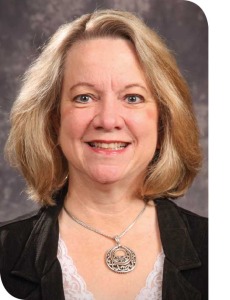 Suzanne Discenza
Suzanne Discenza
Park University
Note to policy wonks who think they know the Affordable Care Act: If you haven’t digested every one of its 418,779 words, do not engage Suzanne Discenza in a debate over its meaning. Because she has read every line of it. Which is what one might expect from a public-affairs guru of her stature: She’s the director of the master’s program in health-care leadership at Park University’s Hauptmann School for Public Affairs.
There, students from various walks—inside and outside of health care—learn not what to think, but how to think about challenging issues of the day.
“This isn’t a popular answer,” Discenza confesses, “but I actually overall am supportive of the ACA if its original intent had continued forward.” Instead, the messengers from D.C., she says, failed to make sure the business sector and public were fully informed on the positive aspects of the law—such as closing the doughnut hole on prescription drug costs for seniors, or removing pre-existing conditions for those deemed uninsurable through no fault of their own. “Most people would say those are good things,” Discenza says.
That’s what she does: She helps students connect policies with the real-world implications of managing them. The path to that role was hardly traditional; raised mainly in Oklahoma in a military family, she earned her teaching degree from O-State.
A stint in K-12 instruction led to the realization that it was “not what I wanted to do with the rest of my life,” she says. Grad school at OU yielded as master’s in communications disorders, opening a door to health care. She worked in hospitals and nursing homes, had her own rehab business for more than eight years and developed contacts across the sector. “I’m not sure there was any sector in health care I didn’t touch at that time,” she remembers. But the Balanced Budget Act of 1997 wracked long-term care and home-health companies with reduced federal reimbursements, and after laying off two-thirds of her staff—and eventually closing the business— “I thought, ‘I really need to know more about the government.’” That led to a reinvention of herself, and eventually, to Park.
“I tell my students we are going to learn together and we are going to learn from each other,” Discenza says. “Teaching health policy now, that is so true—by the time I can make one statement regarding a policy, it has already changed,” she says, validating the frustrations of insurers tracking hourly updates in ACA regulations. “In the master’s program, sometimes things change so fast, I have my students correcting me!”
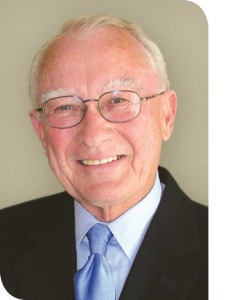 Charles McClain
Charles McClain
Truman State University
The morning of Charles McClain’s 16th birthday found him addressing students in a one-room school—as the teacher. He’d graduated from high school at age 15 and found his calling even before picking up his college degree at age 22, without a lick of student debt.
“One of my early first-grade students did not say a word until the third month of school,” he recalls. “She was shy beyond belief. I extended her patience and treated her as if she were an active participant. I think her response to kindness helped me realize the profound impact that a teacher has on young minds.”
That sentiment would inform McClain’s approach to teaching, and eventually, academic administration, for decades to come, culminating with his tenure as president of Truman State University from 1970 to 1989. Another early value he embraced was securing the support of his students’ parents. He came to know many of them before the 9 a.m. start of classes in that school room because he was there early to fire up the stoves on cold mornings. “I made a point to visit with them each day,” he says. “As a result I had good rapport with parents and the students understood that their parents would support me” in efforts to restore some badly needed classroom discipline.
At the university level, he says, the call to go into administration grew out of a conviction that he understood what it took to be a good teacher, and the appreciation that should be shown to subordinates. “Selecting high-
quality persons requires an academic administrator who believes in excellence and will help create a culture that holds the profession in the highest esteem,” McClain said. “In a real sense, the leader is the servant.”
Among his signature achievements at Truman State was the inception of external examinations to ensure that the university’s degrees retained their integrity, and that its graduates were well qualified to enter
graduate/professional schools and the work force.
He also pushed for ways to bring better-qualified teachers into classrooms, noting research that suggests a superior instructor can inspire students to pick up an additional full year of academic progress, compared to the learning levels demonstrated by students of poor teachers.
“The need for high standards to enter the profession of education has never been greater,” he says. “We need to invest in great teachers, and then students will be prepared to enter college/university without the need for remedial courses. Access to college is about academic preparation—not the lack of financial resources.”
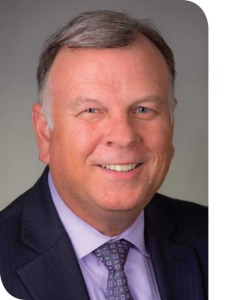 Kevin Truman
Kevin Truman
University of Missouri-Kansas City
He’s vice provost and dean of the School of Computing and Engineering at UMKC, so Kevin Truman’s job is all about leadership.
But before he would become an effective leader, he had to properly learn the art of following: Following the examples of his parents, who taught him “to be respectful, to listen, to work hard and to say thank you,” he says. Following the guidance of his high school chemistry teacher, who nudged him toward engineering studies. Following the advice of college professors who steered him into more challenging programs and toward the teaching of it. “I had great mentors,” he says, “and people who believed in me.”
That’s not to say this product of tiny Seaton, Ill., didn’t exhibit leadership qualities of his own as a youth. Even on the baseball diamond, he jumped at the position most kids recoil from—catcher. “I wanted to be part of every play, call the pitches, direct player positioning, and be a leader on the field,” Truman says. After overcoming an early indifference to college, he ended up at nearby Monmouth College, earning a degree in math and physics. A professor there had urged him to apply to Washington University, where he earned his degree in civil engineering, then a master’s in the field.
Just as he prepared to take a corporate job, another mentor suggested he go after his Ph.D., which he finished at Missouri-Rolla. That led to a faculty position back at WU, and the opportunity to also work with the U.S. Army Corps of Engineers.
He came to UMKC in 2005 as the engineering dean, and found it was the right place at the right time. The resource-rich engineering environment of this region, he says, “is why I am here. We have embarked on a journey to make our school a valued, urban school of computing and engineering in Kansas City. To be valued by Kansas City firms, we need to produce highly qualified graduates, perform cutting-edge research, provide professional development for their employees and provide graduate degrees for their employees.”
The number of engineering firms in this region, he says, “is great for recruiting talent, students and faculty, to our school, and it is good for KC since 80 percent of our undergraduates remain in KC and work for one of these firms. As we continue to grow, our impact on KC will be even greater.”
Getting it done is a challenge best met with leading by example, Truman says: “I try not to ask faculty, staff, students or other administrators to do anything I wouldn’t do myself.”
 Richard Herman
Richard Herman
University of Central Missouri
His own father had been pulled from school after third grade to work full time on the family farm, but Dad had a different vision for Richard Herman’s path through life. “It was key to him that his kids receive a college education,” said Herman, a first-generation college graduate. Yet what he learned on the farm near Garden City, Kan., would pave the way for career-long success, most of it at the University of Central Missouri: “I really loved that experience, because it developed a work ethic in me that I infuse in my students on a daily basis.”
High school gave young Herman exposure to gifted teachers who inspired him to join their ranks, although he at first envisioned a role as a history teacher. The influence of a speech teacher introduced him to acting, where “I found that I loved the theater, particularly directing,” Herman remembers.
He earned his degree in speech and drama at the former Marymount College in Salina, then a master’s at UCM and a Ph.D. in acting and directing from Texas Tech. After starting off as a high school instructor in southwest Kansas and Jefferson City, he worked in several university drama departments, but kept his hand in directing theatric productions in those various locales. He made his way back to Warrensburg in 1987, and became chair of the drama department in 2001.
That’s when he sensed an opportunity to take the university’s programs to a new level.
“I always wanted to have a music theater program,” he said, “but to do that, we needed a dance program. I began to champion that,” pushing for expanded faculty slots, recruiting to fill them, building a studio, designing the courses and hiring a choreographer. The result? “It’s been tremendous,” Herman says. “It allowed us to create a degree in musical theater, and the courses are full. We’ve been able to add a dance minor, and have two dance programs every year on the main stage.”
He’s been involved in more than 150 UCM stage productions, directing many of them. He’s won multiple teaching awards, and last year won the prestigious Kennedy Center Gold Medallion from the center’s American College Theatre Festival.
His true achievements, he says, lie with former students who have gone on to win Tony awards, Golden Globes and Oscars. Even more, “a number of students from the ’80s have children pursuing education in theater here,” he marvels. “That really is an honor: They valued that education enough that, with their own son or daughter in college, they sent them back to where they learned.”